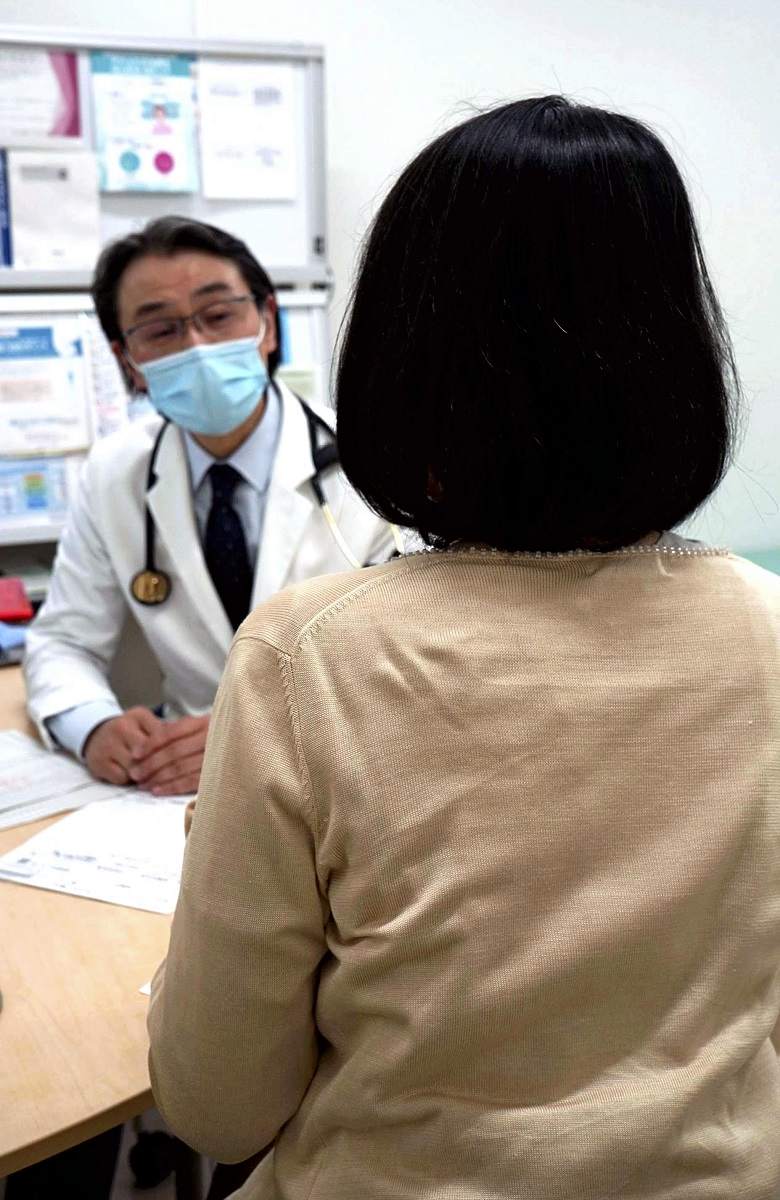Long COVID Forces 50% to Quit or Take Sick Leave From Job; Some Employers Dismiss Staff’s Needs, Say Illness Not Real

A woman from Himeji, Hyogo Prefecture, who suffers from long COVID, talks about her symptoms with a doctor at Okayama University Hospital in Okayama.
6:00 JST, August 22, 2024
Many people suffering from so-called long COVID have been forced to quit their jobs or take sick leave due to their weakened health.
A recent survey by Okayama University found that half the respondents with long COVID had been forced into such a situation. This was attributed to such factors as uncertainty about when they would recover and a lack of understanding at their workplace.
Experts are urging companies to show consideration for people with the condition.
I want to work but…
In March, a 56-year-old woman from Himeji, Hyogo Prefecture, quit her job as a cook at a restaurant where she had worked for seven years.
“I’m devastated. It was my ideal job,” the woman said. She had previously been a clerical worker but found this job so that she could turn cooking, something she loved, into her profession.
The woman caught COVID-19 in August 2022 and was left with such symptoms as headaches and breathlessness. She felt so lethargic she could barely hold a frying pan, but even though she talked to her supervisor about her health problems, she could not get her work responsibilities lessened.
She lied down somewhere private during breaks, but she reached the limits of what her health would allow. After taking sick leave for seven months, she quit because no recovery was in sight.
Resting may be counterproductive
The World Health Organization defines long COVID as “the continuation or development of new symptoms three months after the initial SARS-CoV-2 infection, with these symptoms lasting for at least two months with no other explanation.”
Common symptoms include coughing, breathlessness, fatigue, disturbed sleep and taste disorders.
Okayama University Prof. Fumio Otsuka interviewed patients who visited Okayama University Hospital for long COVID during the last two years through December. Otsuka found of the 545 patients who had been working, 220 — or 40.4% — had to take sick leave from their jobs and 53 — or 9.7% — had to resign.
Some of the patients were under mental strain as well, as their superiors kept making remarks like “there’s no such thing as long COVID.” Others resigned because they did not want to inconvenience anyone, as they did not know when they could return to work.
“If people have financial concerns, their symptoms may get worse because taking sick leave could be stressful for them,” Otsuka said. “Companies need to make workers aware of long COVID and provide a system that helps patients return to work smoothly and comfortably so they can take time off with peace of mind.”
Showing consideration
One company is taking steps to help its workers balance work and medical treatment.
A 41-year-old man at the Okayama plant of Tokyo-based machine parts manufacturer Eagle Industry Co. suffered from fatigue and other symptoms after contracting COVID-19 in August 2021. After six months of paid sick leave, he began working from home two days a week.
After about three months, he was able to come to work. To reduce his workload, the man changed his responsibilities from section manager to work that he could perform alone. In July, he returned to his position as section manager.
“The company helped me out, and I was able to recuperate without worry,” he said.
His supervisor, 62, recalled: “It was good that we told our other employees about his symptoms and how we were handling the situation, so they wouldn’t think he was getting special treatment.”
He then advised the company to implement a series of measures in other departments as well.
Dr. Yu Igarashi, a lecturer at the University of Occupational and Environmental Health who is familiar with balancing work and medical treatment, said: “The symptoms differ from person to person. It’s good that this company listened to his symptoms and dealt with the problem flexibly, and also helped him alleviate his physical and mental stress by allowing him to come back to work gradually.”
Igarashi said the following measures are considered effective: Allow employees to work from home or take breaks during working hours; create an atmosphere in which supervisors pay attention to their subordinates’ condition and make it easy for them to talk about their health problems; and establish an in-house consultation service and make sure employees are aware of its existence.
Top Articles in Society
-

Producer Behind Pop Group XG Arrested for Cocaine Possession
-

Man Infected with Measles Reportedly Dined at Restaurant in Tokyo Station
-

Man Infected with Measles May Have Come in Contact with Many People in Tokyo, Went to Store, Restaurant Around When Symptoms Emerged
-

Woman with Measles Visited Hospital in Tokyo Multiple Times Before Being Diagnosed with Disease
-

Australian Woman Dies After Mishap on Ski Lift in Nagano Prefecture
JN ACCESS RANKING
-

Japan PM Takaichi’s Cabinet Resigns en Masse
-

Japan Institute to Use Domestic Commercial Optical Lattice Clock to Set Japan Standard Time
-

Israeli Ambassador to Japan Speaks about Japan’s Role in the Reconstruction of Gaza
-

Man Infected with Measles Reportedly Dined at Restaurant in Tokyo Station
-

Videos Plagiarized, Reposted with False Subtitles Claiming ‘Ryukyu Belongs to China’; Anti-China False Information Also Posted in Japan





















